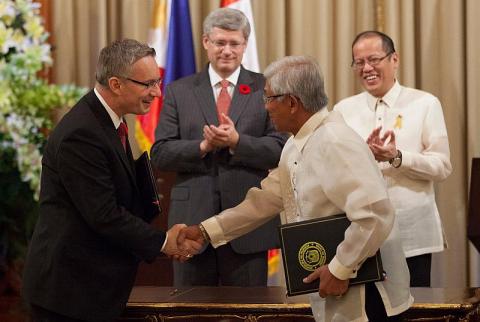
“Greetings, everyone.
“As the Prime Minister of Canada, it’s always a great pleasure to welcome our friends to Montreal , a city renowned worldwide for its creativity and its dynamism.
“First of all, I’d like to thank Mr Desmarais for his kind introduction. I would also like to congratulate the organizers of the Conference of Montreal.
“They have done a truly remarkable job once again this year, and I would ask you to give a warm round of applause for a man with a great vision, the Founding Chairman of the Conference, Mr Gil Rémillard.
“I also want to note the presence of a number of Canadian companies that help to make this conference such a great success year after year.
“As it does every year, this Conférence is addressing a number of very hot topics related to the international economic situation.
“And the theme that most grabs our attention, once again this year, is obviously the instability of the global economy.
“The global economic crisis, whose effects we are still feeling, has revealed the most fundamental flaws of the Western economies.
“In that context, Canada remains in a very advantageous position.
“Nevertheless, Canada is very much a part of the global economy, and therefore, we are sometimes at the mercy of its challenges, particularly these days with the crisis in the Eurozone.
“I am genuinely encouraged by the agreement that was concluded this past weekend among members of the Eurozone to stabilize the Spanish banking situation.
“These are the kinds of measures that Europeans themselves are able to undertake, and that they must undertake, to move their economy forward.
“This is the type of self-help that Canada favours.
“But problems remain for most Western governments.
Advertisement / Reklaam
Advertisement / Reklaam
“Debt is one of the most important and the international markets have reacted, of course, by increasing borrowing costs significantly for some of the countries with the highest debt loads.“Several financial institutions are also fragile and, of course, the population is ageing.
“These are all substantial challenges that we can simply not ignore.
“But because of political difficulties, some have tried to put forward a false choice: a choice between fiscal discipline and economic growth, between austerity and prosperity.
“Austerity or prosperity, why didn’t I think of that?
“If only it were so easy.
“If it were, ladies and gentlemen, a lot of economists would be out of a job, and this Conférence would not exist.
“The reality is very different, obviously.
“This will be Canada’s message at the G-20 Summit: economic growth and fiscal discipline are not mutually exclusive; they go hand in hand.
“In fact, Canada ’s strong record of fiscal discipline is one reason we have weathered the economic crisis so much better than many others.
“We had budget surpluses and a low and falling debt burden when the crisis hit.
“Financial discipline is what enabled us to quickly put in place extensive, effective stimulus measures when they counted the most.
“And this is a modest, medium-term approach to restore a balanced budget, which makes Canada one of the safest havens right now, as the global economy is grappling with the debt crisis.
“But although budgetary discipline is essential, it is still not enough by itself to ensure growth.
“The Canadian approach is what the world needs.
“A practical approach, an approach that works, an approach that includes both fiscal discipline and other growth measures.
“That is why our government is pursuing, for example, a very ambitious trade agenda; a record number of free trade treaty negotiations.
“One of the most important, of course, is the Comprehensive Economic and Trade Agreement we are negotiating with the European Union.
Advertisement / Reklaam
Advertisement / Reklaam
“Trade liberalization is, of course, not always easy politically, but it is an effective way and an inexpensive way to create growth and jobs and ensure long-term prosperity.“We have also undertaken measures to deal with the coming demographic shifts and to reform our labour markets.
“So we are making changes to our immigration system to attract those with the skills most needed as quickly as possible.
“We are also revising the employment insurance program to guarantee Canadians that it will always be more profitable to go to work if the work is available than to cash an unemployment insurance cheque.
“We’re also revamping our research and innovation policies.
“We want to obtain better commercial results for every precious tax dollar we allocate to science and technology innovation.
“And finally, we are reforming our regulations, especially our systems of environmental assessment to ensure that, while thoroughly examining and evaluating all environmental risks, we minimize burdens and maximize certainty for investors.
“In the coming years, projects with a total value of 500 billion dollars will be assessed here in Canada .
“Our environmental assessment system must be, and will be, rigorous.
“But it must also be effective, with clear deadlines and decisions.
“Ladies and gentlemen, I say all of these things with the qualification that as Canadians neither are we able, nor do we desire, to impose our views on the world.
“But Canada can demonstrate through our actions a model that works.
“As you know, Canada weathered the last global economic crisis very well.
“There are more Canadians working today than there were before the crisis began.
“Our financial institutions are the most solid in the world.
“And we will return to balanced budgets by 2015.
“But we are not sitting on our laurels.
“By continuing to soundly manage public finances and by acting now to take control of our future, Canada will continue, for a long time to come, to lead by example in terms of economic growth, job creation, and long-term prosperity.
Advertisement / Reklaam
Advertisement / Reklaam
“Thank you very much, everyone.“And have a great Conférence!”























